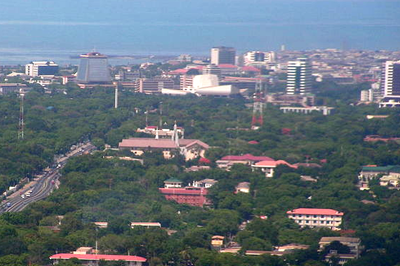 |
| Image Source:greencitiesmedia.com |
When a home is green, it means the home design has considered protecting the environment and is able to be easily maintained for a long period. This involves every part of the building from the foundation to the roof and all the elements and systems running in between. It also implies water and energy is designed to be used efficiently in the home and materials used for building the home is natural and sustainable.
This trend is important for Ghana considering the regular shortages of water and rationing of electricity. Building green reduces utility costs and saves you a lot of money--you partake in the call for water and energy conservation thus contributing to environmental protection.
Below are 7 ways to make your dream home green in Ghana.
- Fix compact fluorescent lamps (CFLs) and Light-Emitting Diode (LEDs). These are usually referred to in Ghana as ‘energy saving bulbs’ and they reduce energy consumption as compared to traditional incandescent bulbs. The lighting is brighter and safe for working especially reading. They don’t give out much heat and is long-lasting than normal bulbs. Even though the price is higher the eventual savings in energy cost is prudential
- Install high-efficiency water conservation toilets. From research about 26% of water used in the home is for flushing the toilet. The amount of water used per flush can be reduced to conserve water. There are different types of toilets on the market classified according to the gallons of water per flush. Some use about 3.5 gallons per flush (gpf) which is quite high but other modern ones allow 1.6 gpf. You can even look out for as low as 1.28 gpf toilets. On the other hand, rain water can be stored and used for flushing to preserve tap water and have great savings on water bills.
- Use recycled sustainable building materials. Materials such as bamboo, granite, marbles, stones, recycled glass and treated timber can be employed for the flooring, wall partitioning, doors and windows. The kitchen worktop and cabinets must be of a renewable and durable material to keep your home green. Several options are available and Ghana Homes can assist you during the decision making process. Wall cladding or paintings must also be of environmentally friendly products with high sustainability features. Plan to ensure very low wastage during installations and construction.
- Build what you need not what you want. Many people dream of living in huge houses but fail to understand its running and maintenance is costly. It is important to analyze your family size, needs and cash flow before building or choosing a House Plan. Unnecessarily large homes tend to have a lot of wasted or dead spaces; one that is of no use. These unusable spaces not only increase construction cost needlessly, but also maintenance cost of the home. If you plan to increase your family or occupants in the future, design the home to be expandable later to save you money now. Ghana Homes is ever ready to discuss your needs and propose suitable House Plans.
- Have an effective roof design in place. The roof serves as a protection for the home hence much attention must be given to its design and construction. The roof type must suite tropical climate to create a comfortable indoor environment. Though flat roofs may retain water as compared to sloping roofs, an effective drainage system prevents this. The drainage system and insulation of the roof is critical for the buildings efficiency. The roof design must be eco-friendly and sustainable.
- Make the most of natural day lighting and ventilation. Your dream home must be able to support occupancy at all times for a really long period of time. Spatial planning and areas demarcated for openings such as windows and doors must allow adequate natural lighting during the day and free flow of natural air always. Rooms and interior spaces must be well lit during the day. This can reduce your electricity bills on lighting and cooling. Windows must be designed to have cross-ventilation with sizes well calculated to bring in the required natural lighting.
- Plant trees and have extensive landscaping. Having trees, plants, flowers and grass around your home freshens and cools the building regularly. You actually spend less in trying to cool the house every day. Indoor plants not only add to the interior beauty but contribute to improving indoor air quality through the release of oxygen. The trees provide shade and prevent contact with the sun’s direct infrared radiation. Landscaping also offers a relaxation and safe play area for kids. Marbles, pebbles, beach sand and water are some eco-friendly materials which can be used.
Do You Have an Uncompleted Building Project in Ghana?
Let Ghana homes complete it for you. Contact us to learn more.Do You Need a Builder or a Contractor in Ghana?
Let Ghana Homes build your dreams home at a price you can afford: a custom home that fits your style, on your own land or ours with these three simple steps:- Select and finalize a House Plan here (we can customize as needed)
- Work with Ghana Homes to get a bill of quantity (pricing)
- Sign a contract to secure price
- Make the required down payment (or with a pay as you build plan)
- We begin construction
Use any of the social icons below to share this article.












